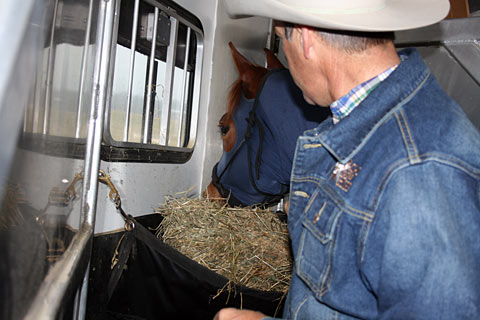 |
 |
|
Cross Country Horse Hauling
From Richard Winters Performance Horsemanship
In March my wife and I, along with two horses and a little dog, embarked on a two month horsemanship tour where we’ve been conducting clinics and presenting at horse expos around the country.
Our stops have included Tennessee, Nebraska, South Dakota, Ohio, Pennsylvania, and Wisconsin. By the time we return to
California we will have hauled our horses over 7,000 miles. For the veteran horse hauler, this is no big deal. For the novice who rarely hauls further than the local county fair, it might seem overwhelming.
Here are a few considerations and helpful tips for your next big road trip.
Trailer Maintenance – Repacking the wheel bearings, checking brakes and lights, along with inspecting your trailers flooring
are all important items to have inspected before heading out.
Trailer Bedding – Even with quality rubber mats on your trailer floor; some type of bedding will be important to prevent your
flooring from becoming dangerously slick from manure and urine.
Documentation – When traveling over state lines you’ll need to have a copy of a horse’s negative coggins test and a health
certificate and or brand inspection. Coggins tests are normally good for at least six months. Health certificates are generally valid for
only thirty days. Any veterinarian can assist you with these tests and documents. I also like to have a bill of sale or registration papers
that prove ownership should any questions arise at boarder crossings.
 |
Feed – On an extended trip it probably is not practical to haul all of the hay your horses will need. As you travel through different
regions you’ll find that hay quality and types vary significantly. By the time I reached Tennessee I could not find any more alfalfa. (This
is what my horses had been eating.) Before I finished my last alfalfa bale, I began feeding some of the new grass hay I had purchased
in Tennessee. Making this incremental transition helped my horses adjust to the new feed. You can also consider processed bag feed that would be more consistently available in different regions.
Climate Changes – The temperatures in California are much different than what might be found in South Dakota. Before
leaving, I outfitted each of my horses with a lite sheet and hood along with a heavy set as well. You should also pay attention to
temperature changes throughout the day. You might load up on a frosty morning with heavy blankets on your horse. By the afternoon
you’re 300 miles away and it’s 70 degrees. Now your horse is hot and sweaty underneath an uncomfortable blanket.
Duration of Travel – It’s been my experience that a horse can haul very comfortably for 500 miles without being unloaded. I
try to always have hay in the manger for my horses to eat. If the weather is extremely warm, I’ll offer a drink to my horses midway
through the day. Don’t allow your trailer to turn into a sauna. Opening vents and or drop down windows is important for good
ventilation. Hauling at night is also a viable option when traveling through regions where temperatures are 100 degrees plus or humidity is extremely high.
Overnight Stabling – Twenty-five years ago I would carry a small directory of horse hotel listings from around the country. In
this high tech age, my wife simply googles (for example), “Lincoln, Nebraska Horse Hotels” while we’re driving down the highway.
When she finds one that seems appropriate and accessible, I call them up and make arrangements to be there in a couple of hours.
We drive a pretty big rig. Inquiring about driveways and turn-a-round room is important with larger trucks and trailers. You find that
most of these horse hotels cost approximately $15.00 - $20.00 per night and may also allow RV camping.
Vet Kit – As you know anything can happen when dealing with horses. When you’re on an extended trip you might be forced to
deal with an accident or illness with your horse. When a vet is not immediately available, you should be prepared to administer some
immediate care until professional help arrives. A few items in my kit include: Bute paste (pain reliever and anti-inflammatory),
Banamine paste (muscle relaxant), thermometer, antiseptic spray and salve, gauze pads, gauze rolls, cotton roll, and vet wrap.
As with children, every horse has different traveling needs. Some are low maintenance while others require more consideration. By
remembering and applying good horsemanship skills most of the drama and trauma can be removed from your horse hauling experience.
For more information about Richard Winters Horsemanship please go to wintersranch.com.
|
 |
 |
 |
 |
 |
|
To advertise your horse product or service, Contact Ann
|
|
|
|
InfoHorse.com, Horse Information Lives Here ®
3/4/2026
Contact Us to Advertise to over a million Horse Owners.
All images and content Copyright© 2022 by InfoHorse.com,
|
|
|
|
Articles, Academic Schools, Arena Maintenance, Animal Communicators, Barns, Barn and Accessories, Barn Equipment and Tractors, Breast Collars, Grooming Products for Horses, Hay Feeders, Horse Blankets, Horse Breeders, Horse Camping Gear, Career Schools, Horse Training Clinicians, Equestrian Clothing, Dogs and Puppies, Horse Fencing, Horse Products For Sale, Fly Control, Foal Care, Horse Footings, Horse Gifts, Horse Health and Nutrition, Hoof and Leg, Horse Insurance, Certified Trainers, Equine Lawyers, Leather Care, Links , Portable Horse Stalls, Arenas and Roundpens, Horse Riding Schools, Horse Schools, Safety Products, Services for Horses, Horse Trailers, Horse Shipping, Horse
Skin Coat Care, Specialty Trainers, Horse Summer Camps, Tack, Horse Trainers, Treats and Snacks, Truck Accessories, Trucks, Horse Vacations, Western Lifestyle
|
|